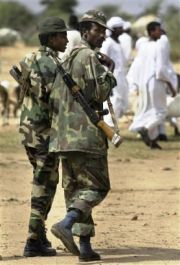AU urges Sudan to disarm Janjaweed militia
Dec 15, 2006 (ADDIS ABABA) — The African Union called on the Sudanese government to “immediately disarm” the pro-government Arab Janjaweed militias in the war-torn Darfur region or face sanctions.
 After a meeting of the Joint Ceasefire Commission on Darfur in Addis Ababa, the deputy head of the peace mission, Monique Mukaruliza, said: “The participants recommended that disarmament of the Janjaweed be started immediately.”
After a meeting of the Joint Ceasefire Commission on Darfur in Addis Ababa, the deputy head of the peace mission, Monique Mukaruliza, said: “The participants recommended that disarmament of the Janjaweed be started immediately.”
“We understand from the report that was presented by the AMIS (AU Mission in Sudan) commander, the Sudanese government continues to arm the Janjaweed,” she said.
“The meeting decided that where violations had clearly been proven to have taken place, punitive measures including sanctions should be taken against the violators,” a text agreed at the meeting stated.
The AU’s Peace and Security Council and the UN Security Council would enforce the sanctions, it specified.
The Commission examined “15 confirmed and documented cases of ceasefire violations by signatories and non-signatories of the peace accords” in Abuja and “decided to punish the violators,” the AU statement said.
“The disarmament depends on the political will of the Sudanese government,” Mukaruliza explained. “The government of Sudan has the means to disarm them, it has weapons, but it is up to them to disarm them.”
She said the process of putting the militias’ weapons beyond use should already have started, according to the agreements already signed in Abuja.
The delegation from the Sudanese capital Khartoum left the meeting shortly after it started on Friday morning in the Ethiopian capital.
In a confidential report presented to the Joint Ceasefire Commission, seen by AFP, the commander of the AMIS peacekeeping force, Nigerian General Luke Aprezi, testified that the Janjaweed had recently increased their attacks.
In the six-page report, the general states that “the re-emergence of the Janjaweed also negatively affected the security situation.”
The AU also assessed in its official statement that “the security situation in Darfur is fast deteriorating, mainly because of the re-emergence of the Janjaweed militias who seemed to have been re-supplied and rearmed.”
The union said it “deplored the attacks on AMIS personnel and its installations,” in particular the abduction of one of its military officers on Sunday and “called on the perpetrators to immediately and unconditionally free him.”
Aid agencies said on Friday they had to pull out 650 staff from Darfur and Chad, disrupting supplies to hundreds of thousands of people, because of security fears.
Oxfam International, Norwegian Refugee Council, Goal and other agencies said they had temporarily evacuated more than 250 workers from Darfur and another 400 from just across the border in Chad in the last two weeks.
Speaking on behalf of these and several other agencies, Oxfam said a mix of international, Sudanese and Chadian aid workers were redeployed to safer areas of Sudan and Chad, awaiting for security to improve.
International efforts to send a hybrid force of United Nations and African Union peacekeepers have faced Sudanese government resistance.
The war in Darfur erupted in February 2003 when rebels from minority tribes took up arms to demand an equal share of national resources, prompting a heavy-handed crackdown from the Sudanese government forces and their Janjaweed proxy militia.
(AFP)
